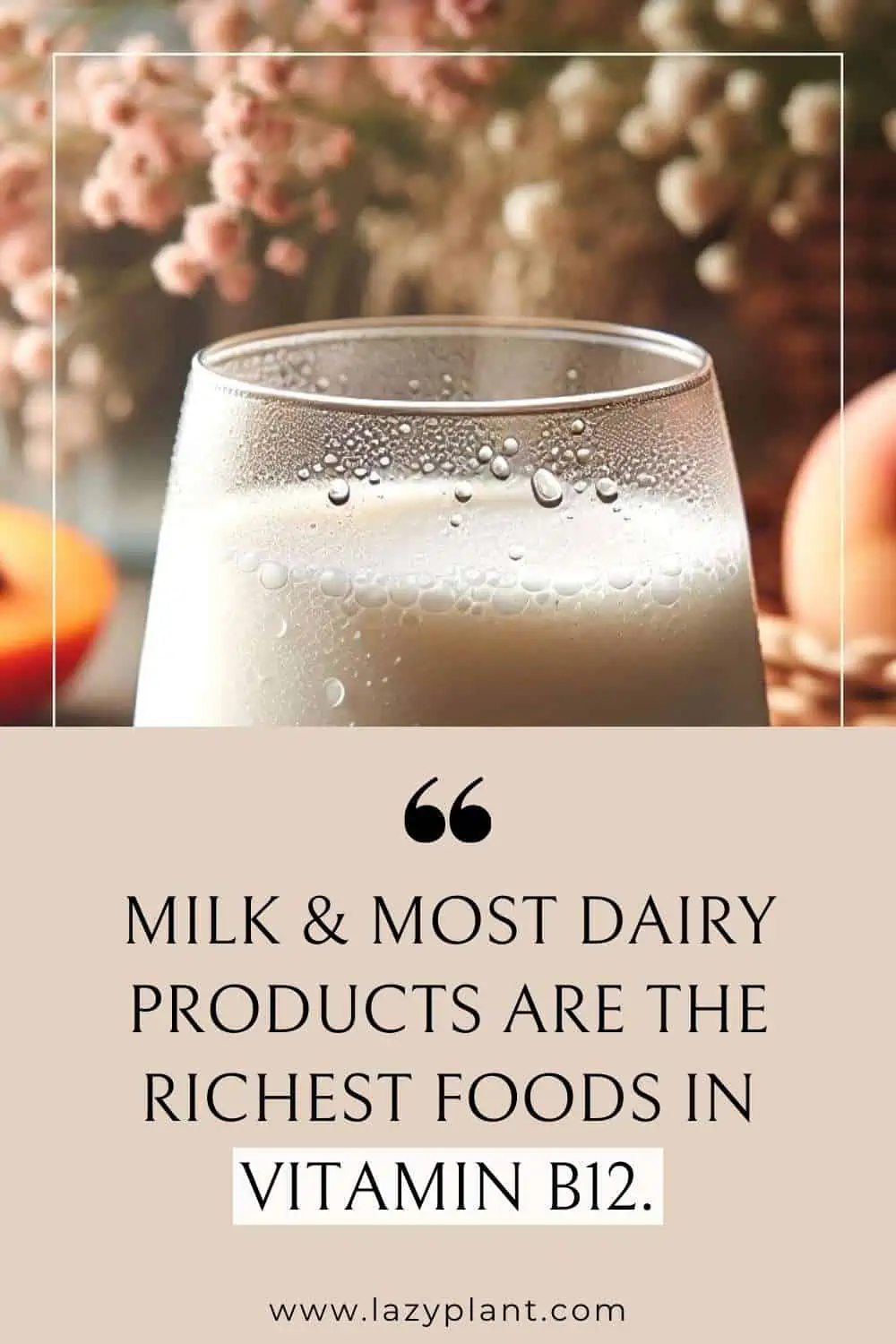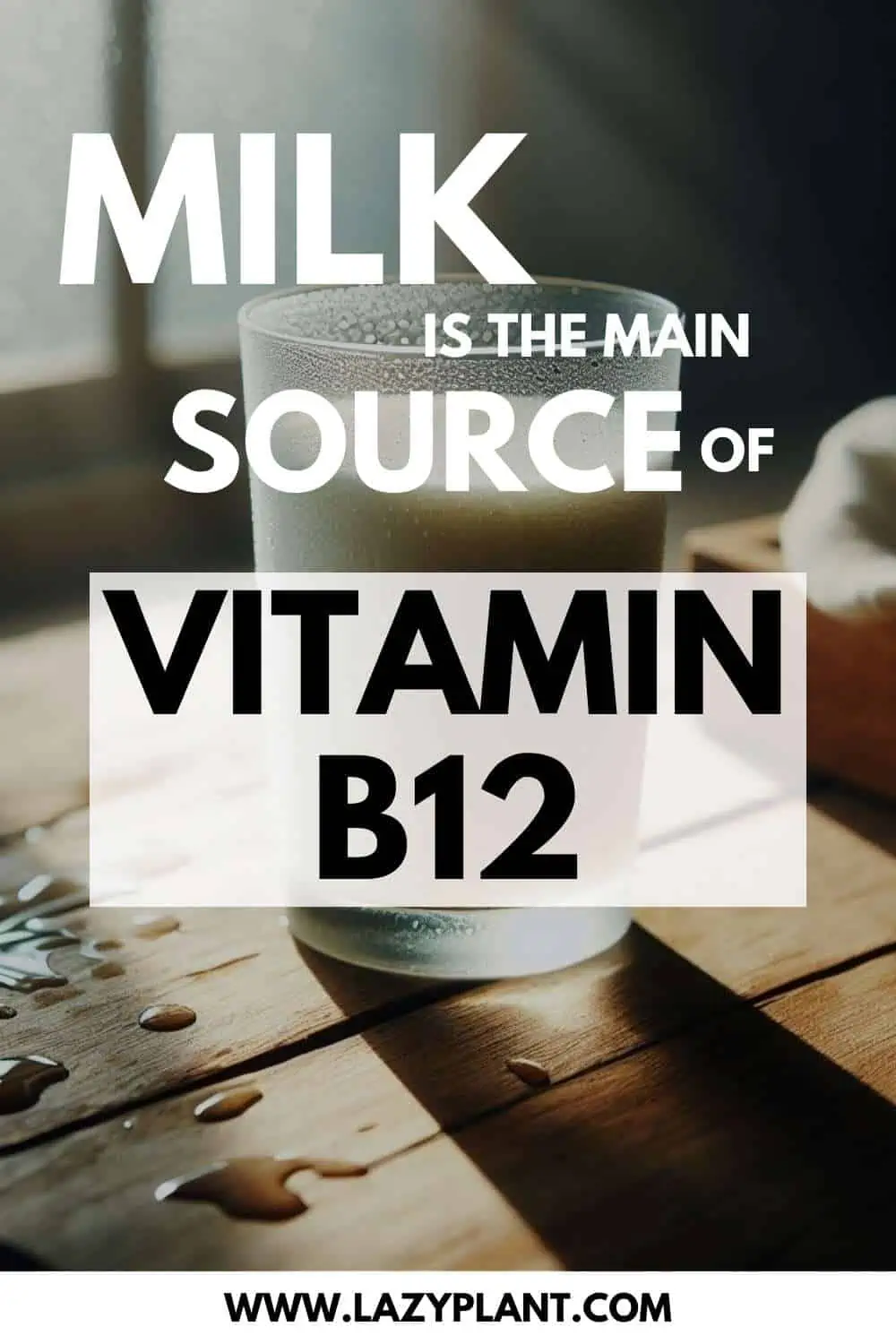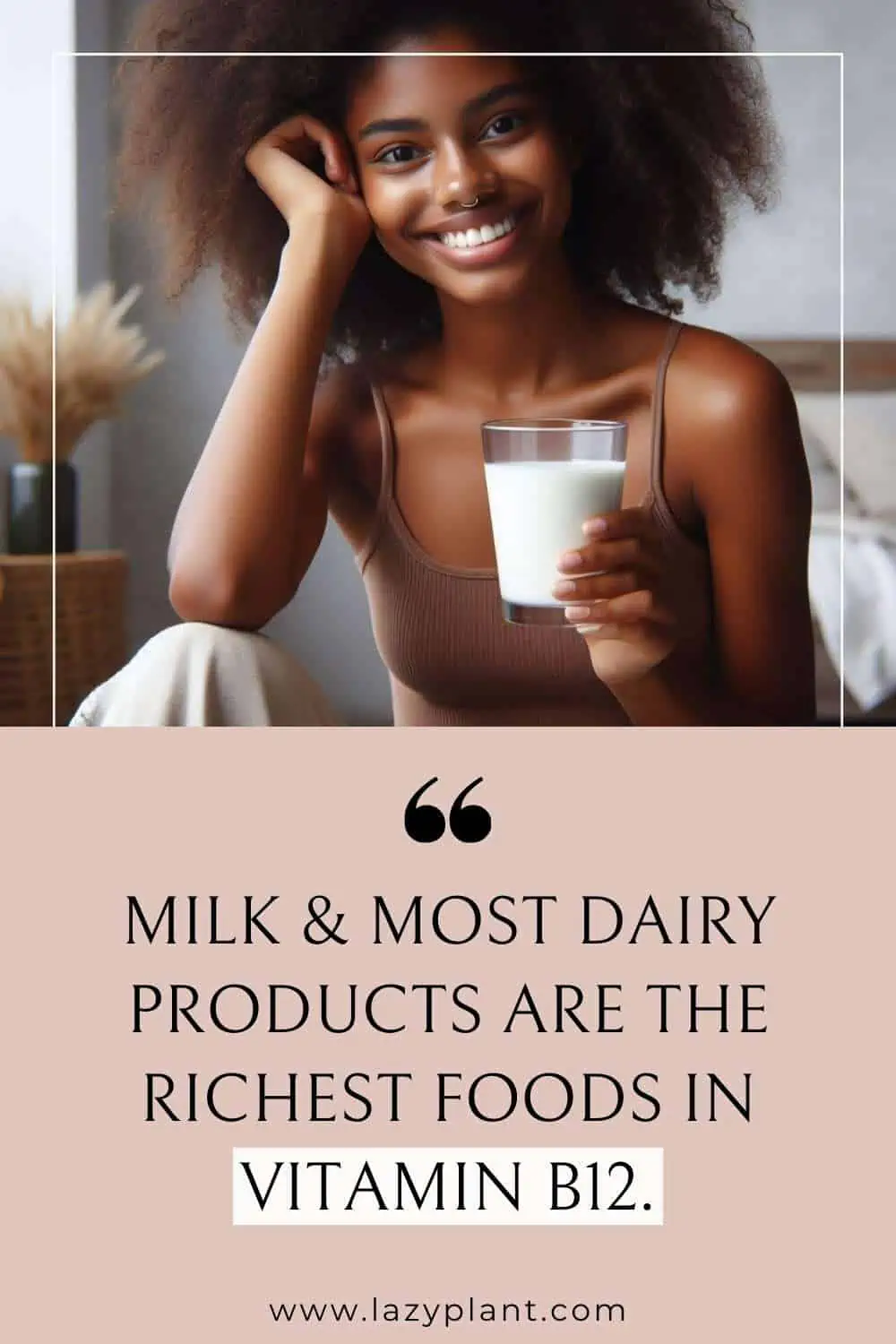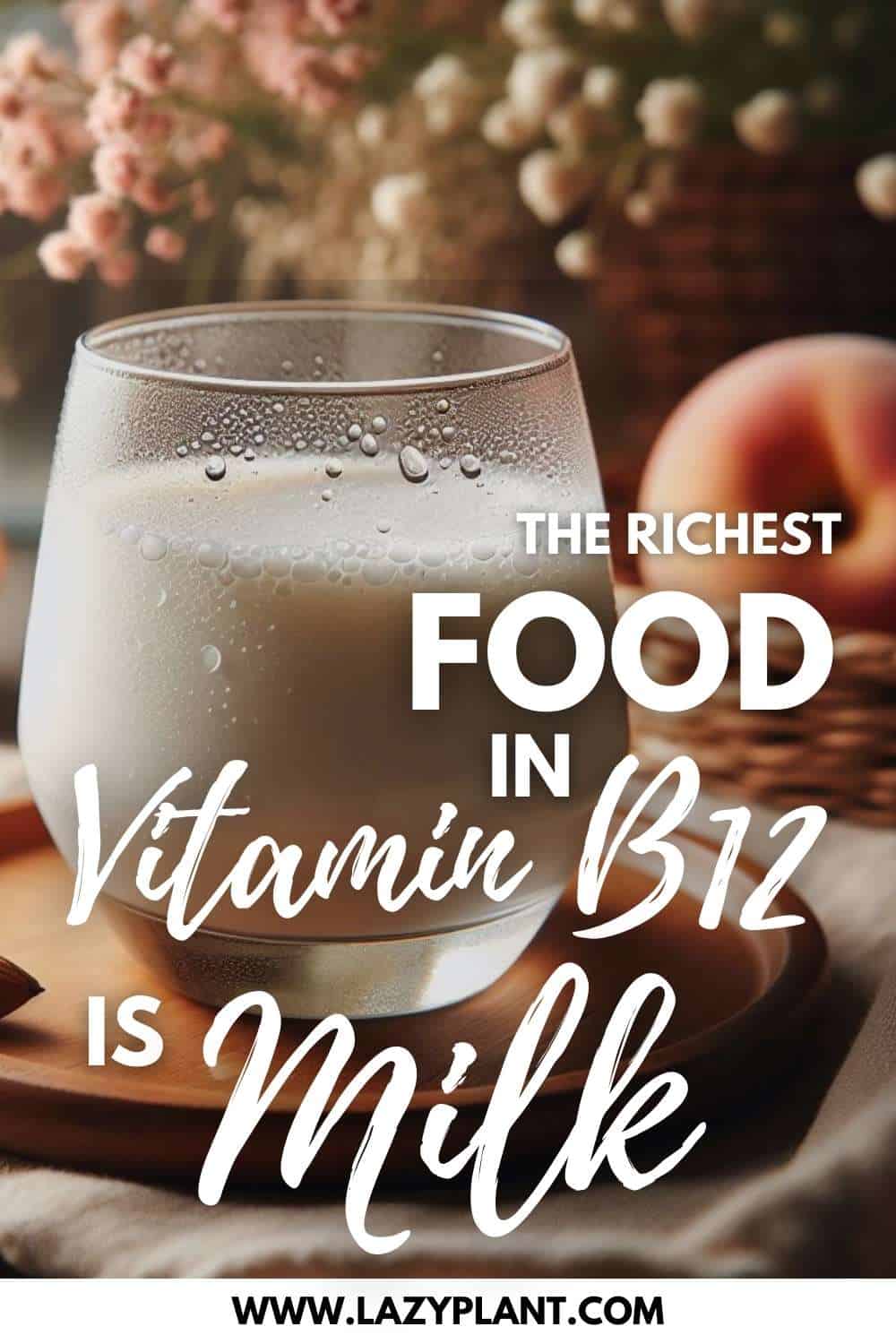Cow’s milk is the most common dietary source of vitamin B12. It’s among the richest foods in vitamin B12, containing up to 1.5 mcg of vitamin B12 per serving, which is more than 60% of the Daily Value. Also, milk is the most bioavailable source of vitamin B12. Almost all other dairy products are naturally rich in vitamin B12 as well.
Health benefits of vitamin B12
Vitamin B12 is crucial for good health. It’s involved in DNA synthesis, red blood cell formation, cellular energy production, and the proper function of the central nervous system.[1,2]
Also, it plays a key role in the metabolism of homocysteine. High homocysteine levels increase the risk of many diseases.

Vitamin B12 deficiency may lead to anemia, neuropathy, neurodegenerative disease and cognitive impairment.
Pregnant women should get enough vitamin B12 to decrease the risk of neural tube defects.
Keep in mind that folic acid supplementation may mask the symptoms of vitamin B12 deficiency.
How much vitamin B12 should we get in a day?
The recommended daily intake of vitamin B12 is 2.4 mcg. Both for women and men.
Pregnant and lactating women require slightly higher doses of 2.6 mcg and 2.8 mcg, respectively.
Is vitamin B12 deficiency common?
In fact, vitamin B12 deficiency is pretty common.
We can’t synthesize it. We have to get it from food. But, there aren’t many common foods high in vitamin B12. Only certain animal-based foods contain some vitamin B12.
On the other hand, plant-based foods contain no vitamin B12. Only fortified cereals, juices, and nutritional yeasts contain moderate amounts of vitamin B12.
Actually, vitamin B12 is naturally synthesized only by certain bacteria in the soil and microflora of animals. Hence, vitamin B12 is stored in the liver and muscles of animals, and it’s secreted in their milk. Cows and other ruminal animals have the highest vitamin B12 concentrations.[3]
Therefore, milk, dairy and meat products help meet our daily needs for vitamin B12.[4]
How much vitamin B12 is in cow’s milk?
Cow’s milk is considered an excellent source of vitamin B12. Both for adults and children.
Concentrations of vitamin B12 in cow’s milk are highly variable, though. They depend on many factors, like cow breed, season, supplementation, and the diet of cows.
Cows, that are injected with vitamin B12 or take cobalt supplements, have up to 50% greater vitamin B12 concentrations in their milk.
Cow’s milk contains about 0.54 mcg of vitamin B12 per 100g. A glass (250 mL) contains between 1.3 mcg and 1.5 mcg of vitamin B12.[5]
Hence, a serving of unfortified milk provides about 50-60% of the recommended daily intake.
The high vitamin B12 concentration of milk and other dairy products is only one of the reasons why they support weight loss.
Do we absorb vitamin B12 in milk?
Furthermore, vitamin B12 in cow’s milk is highly bioavailable. Actually, the bioavailability of vitamin B12 is 3 times higher in milk and dairy products than in meat, fish, and poultry.
In fact, according to studies, milk consumption improved the vitamin B12 status of people. Eggs and seafood didn’t significantly help people improve their vitamin B12 levels.
Also, vitamin B12 in cow’s milk is more bioavailable than its synthetic form, found in dietary supplements.[6]
The absorption rate depends on the dose, though. It’s 50% at small doses of less than 2 mcg. But, it’s only 1.3% at high doses of 1,000 mcg! That’s a reason why dietary supplements contain such high amounts of vitamin B12.

In contrast, we absorb about 8-10% of vitamin B12 in milk. After all, milk contains much lower amounts of vitamin B12, as compared to supplements.
Furthermore, milk contains specific components which facilitate the absorption of vitamin B12. These components aren’t destroyed during the processing of milk. Also, vitamin B12 isn’t as vulnerable to heat as other vitamins.
In addition, milk consumption with cereal fortified with vitamin B12 could help improve vitamin B12 status. Milk can increase the absorption rates of synthetic vitamin B12 in fortified cereal. Proteins of milk might be responsible for the increased bioavailability.
What’s the vitamin B12 content of fortified cow’s milk?
Enriched cow’s milk is usually fortified with vitamins A and D. It isn’t fortified with vitamin B12.
You’ll get more vitamin B12 from your breakfast, but only if you prefer cereal fortified with vitamin B12.
You’ll find a wide variety of fortified cereal on Amazon. Look at the nutrition facts label. If cereal contains added vitamin B12, it should be shown on the label.
Are dairy products high in vitamin B12?
All dairy products are good sources of vitamin B12. They have much lower vitamin B12 concentrations than cow’s milk, though.
Only some Swiss-type cheeses, which are produced with certain bacteria, may have higher vitamin B12 concentrations.
You can add these cheeses to your favorite chicken or turkey sandwich to boost your daily vitamin B12 intake.
Heating and fermentation of milk, as well as storage of dairy products for a long time, decrease vitamin B12 concentrations.

Although kefir has less vitamin B12, it’s one of the healthiest beverages you can drink. It’s packed with probiotics, which improve gut health. Among other health benefits, kefir supports weight loss, as it regulates appetite.
Greek yogurt contains 0.7 mcg of vitamin B12 per 100g or 1.1 mcg per serving. The high vitamin B12 concentration of yogurt is a key reason why it’s beneficial for weight loss.
Mozzarella (1.65 mcg of vitamin B12 per 100g), cheddar (1.1 mcg), cream cheese (0.9 mcg), and butter (0.17 mcg) are other common dairy products naturally containing vitamin B12.
Does the cooking of milk destroy vitamin B12?
Vitamin B12 in milk isn’t as vulnerable as other vitamins. It resists pasteurization and heating.
Also, vitamin B12 in milk remains stable during storage in the refrigerator for at least 9 days.
On the other hand, boiling milk for 30 minutes or microwave heating for 5 minutes can destroy up to 40% of the vitamin B12 of milk.
Moreover, prefer consuming pasteurized milk to evaporated milk. The vitamin B12 content in canned evaporated milk is reduced by 65%.
Are other types of milk naturally high in vitamin B12?
All types of milk are good dietary sources of vitamin B12. But, milk from ruminants is the richest milk in vitamin B12. The ruminal microflora naturally synthesizes high amounts of vitamin B12, which are transferred to milk.
For instance, sheep milk contains 0.7 mcg of vitamin B12 per 100g or 1.7 mcg per cup. A serving of sheep milk provides up to 70% of the recommended daily intake of vitamin B12.[7]
Buffalo milk contains 0.36 mcg per 100g or 0.88 mcg per serving.
Only goat’s milk contains negligible amounts of vitamin B12.
Can milk help treat vitamin B12 deficiency?
Drinking cow’s milk has the greatest effect on vitamin B12 status than other foods high in vitamin B12, such as meat, chicken, fish, and eggs. The bioavailability of vitamin B12 from milk and dairy is greater than other sources.
Only fortified cereal has the similar effect on vitamin B12 levels.
Can we depend on cow’s milk to meet our daily needs for Vitamin B12?
Certainly, drinking cow’s milk and consuming dairy can help us meet our daily needs for vitamin B12. But, you better consume milk and dairy in moderation. They’re particularly high in saturated fatty acids. They naturally contain trans fats as well.
According to the American Heart Association, we should consume up to 13 grams of saturated fatty acids and absolutely no trans fats per day. High consumption of saturated and trans fats may increase the risk of heart disease and stroke, and raise LDL-cholesterol.[8]

A glass of whole milk contains about 4.6 grams of saturated fatty acids and 0.28 grams of trans fats! Hence, just a serving of cow’s milk provides 35% of the maximum safe amount of saturated fats.
Even low-fat milk can be high in fats. A glass of 1% milk contains 1.4 grams of saturated fatty acids and 0.09 grams of trans fats.
Other dairy contain even more saturated fats! Cheeses are particularly high in fats. For instance, cheddar cheese contains 19.2 grams of saturated fats per 100g. It contains even 1.14 grams of trans fats per 100g! Just a slice of cheddar cheese contains 3.3 grams of saturated fats or 25% of the maximum safe dose!
Therefore, we should consume milk and dairy in moderation. Better get vitamin B12 from fortified foods or dietary supplements. You’ll find a wide variety of vitamin B12 supplements on iHerb.
How much vitamin B12 in vegan milks?
Vegan milks don’t naturally contain any vitamin B12. But, most milks are fortified with many vitamins and minerals. Vitamin B12 as well
For instance, fortified oat, soy, and almond milks may contain between 0.45 mcg and 1.3 mcg of added vitamin B12 per 100g. So, we can get more than 3 mcg of vitamin B12 per serving; a dose higher than the recommended daily intake!
Always look at the nutrition facts label to see if there is any added vitamin B12 to the milk.
Other common foods high in vitamin B12
We get vitamin B12 only from animal-based products. There aren’t many common plant-based foods high in vitamin B12.
Some types of algae and seaweed, like chlorella, as well as fortified foods are the only good vegan dietary sources of vitamin B12. Also, tempeh is the only soy product containing some vitamin B12.
Beef liver is the richest food in vitamin B12. Just a serving contains more than 70 mcg of vitamin B12. This dose is 2,940% of the recommended daily intake! But, we should avoid eating too much beef liver. As, it’s particularly high in vitamin A, its regular consumption may lead to vitamin A overdose.
Besides milk and dairy, fish, eggs, and meat, are among the richest common foods in vitamin B12.
Furthermore, you could easily boost your vitamin B12 intake by taking dietary supplements. You’ll find a wide variety of vitamin B12 supplements on iHerb.
Vitamin B12 supplements are considered pretty safe. In fact, vitamin B12 toxicity is rather uncommon. Even extremely high dosages of 1,000 mcg are rather unlikely to cause any side effect.